
PESHAWAR: She kept staring into the alley, waiting to get a glimpse of his shadow. Then there was a shadow. But only of his coffin. Bano wrote a letter to her father to tell him this, to tell him how long and agonising the wait had been.
“Papa, ghar laut aa, Mama, ghar laut aa, ghar laut aa….aaj tak har ghar say, har subha sawarey yeh faryaad sunai deti hai,” she wrote.
Bano, 12, was orphaned too suddenly to accept all that has happened. So she wrote a letter to her dead parents and distributed it at the All Saints Church one Sunday, where on the Sunday of September 22 they added to the number of bodies in the courtyard.
With nearly 105 dead and around 250 injured, there are entire neighbourhoods still affected, localities where the collective sense of grief is almost tangible.
Eight months after the attack, the dead seem to be more fortunate than the living. Survivors lie paralysed in house after house, stuck in time that neither allows the hope for a better tomorrow nor takes them back to the blessings of a normal life where their children were alive, where women would not have to be moved from one relative’s house to another after a husband’s death, where children could go to school knowing their parents would be home waiting.
Time has stopped for the church itself. The clock here is stuck at 11:44 - an eerie reminder of the time of the explosion when hundreds of naked bodies, limbs and flesh were strewn across the 1,300 square yards space.

A (cropped) scanned copy of a letter written by Bano, 12, who lost her parents in the blasts.
Rehana Maryam* and the son she never knew
Rehana Maryam was among those hundreds that day. Three surgeries later, there are still multiple fractures on both her legs and she has been bedridden since. Yet, she has an honest, though unconvincing, sense of thankfulness. “No one was found alive where I was standing. All the children around me had died...I saw bodies of adults flying across, while people looked out from their windows, taking pictures and making videos from neighbouring houses. I don’t know how I survived.”
Rehana’s condition has paralysed her entire family. Her husband Sajid Yaqoob, an English teacher at a small private school, has been on leave since then to take care of his wife. In this time there has been no one to make a living for this family of four that lives with the constant fear that he may lose his job any day. Rehana’s brother has taken time off from college and studies in her room, dividing the nursing time with his brother-in-law. The mere economic cost of this one incident will clearly be paid for a long time.
When Rehana walked into church that day she was thinking it might be her last visit for a while. Eight months pregnant, she was at the church to say her final prayers before delivery. “When I heard the sound I instinctively put my bag over my belly, but shrapnel came from the side and directly hit my stomach.” There were bullets all over her body. Her legs were nearly cut off.

So she held on to her legs as she was moved between three different hospitals, fought for space in packed ambulances and watched her body bleed excessively. “I was holding on to my legs as they took me into the ambulance. I knew if I don’t hold tight I would lose my legs completely.”
When she was finally taken for surgery, it was 9:30pm – nearly 10 hours later – and by this time the baby had died. She still deeply misses the son she never knew.
Her two girls, at age 7 and 4, are too young to grasp the magnitude of the trauma they are dealing with. But they know that roles have been reversed and no longer ask their mother to help with anything. Instead, the children are now the caregivers, ever mindful of their mother’s needs.
The church now scares these children, who say they will never go there again. They weren’t with their mother that morning but blame the church for the death they have seen around them. They are yet to completely understand what it means to die though and still think the little brother their parents had told them about is coming home. “Last night they were sitting in my room and fighting about what they’ll name him,” Rehana said.
Her husband Yaqoob is a quiet man who barely speaks at the interview. He has nothing to say about his wife or his deceased child. But he had one request: not to refer to him and other people in the story as ‘minority’.
I promised Rehana I would visit her again. We were both so hopeful that by our next meeting she would be able to move again, until I stepped out of her room. In the living room next door, sitting beneath posters that say ‘Jesus will save you’, family members were discussing Rehana’s last few months.
At present she remains one of the three survivors of the 15-member choir at All Saints Church. Among the living is also Master Stephens.
When Master Stephens stopped playing the tabla
The pastor could miss the Sunday service but not Master Stephens Yaqub. Since he was 10, Master Stephens, as he is known to all, played the tabla at church every Sunday.
“It’s only in the past few months that I haven’t gone. Otherwise, I didn’t miss any Sunday at church my entire life,” he said. “I live for my love for the divine.”
Master Stephens, a retired schoolteacher, was born in Sialkot and studied in Lahore. Then one Christmas Eve he was in Peshawar and played music at a church. This turned out to be the beginning of a new life in a new city. But eventually this city snatched away almost everything he loved.
He had stepped out into the courtyard that day to get water, when the twin blasts occurred and ball bearings went inside his chest. The explosions also left his arms and legs severely injured.
And so, after nearly 40 years of serving Peshawar, the man who would go around the city teaching English to students who could not afford a tutor, is bedridden. Gone with him are his tabla lessons and football training. “I used to teach until late night, be it summer or winter, all over the city.”
Master Stephens’ students have jobs around the world - they are his pride and purpose. Even today, although he is partially paralysed, he gives English tuitions to a couple of students from his bed. But of course, lessons are not quite the same.
A new (damaged) identity
The loss suffered in minutes that day is now the primary factor that defines the people left to pick up the pieces. Shahnaz Bibi’s identification is restricted to the woman who lost her son, husband and sister. Her other son was also injured and five-year-old granddaughter sustained third-degree burns. ”Thankfully, only two people died in the (nuclear) family,” Shahnaz said. She has little else to add about herself. Conversations with her are prolonged, awkward silences.
Then there is the woman in Gulbahar whose first question is if pictures need to be taken of the rods in her legs and arm. That’s all she asks. The picture of her deceased 12-year-old daughter, who was with her in church that day, is placed besides the stretcher and tells the story of what the rest of her life will now be about.
“Have you met Najiyah Bibi? Two of her daughters died... visited the house in Gulbahar? teenage girl and father died ... and Fatima? Her whole body is paralysed…” These are the conversations, such is the identification. Names, professions, personal traits have receded into the background. Now most people are better known for the missing limbs and number of dead family members. So now Fatima to the world is a paralysed woman, devoid of any ambitions or achievements that would have previously been used to describe her.
There is nothing left to identify the All Saints Church too, except for this one tragedy that will always be associated with its name.
For its 130 years of existence, it was known as the church that looked like a mosque. Its domes and minarets were a reflection of interfaith harmony and artists had been hired to inscribe Biblical verses in Persian and Pashto. But now it’s only the church where the blasts happened, the church where the clock remains stuck at 11:44.
*Name has been changed
Published in The Express Tribune, May 31st, 2014.
COMMENTS (4)
Comments are moderated and generally will be posted if they are on-topic and not abusive.
For more information, please see our Comments FAQ


























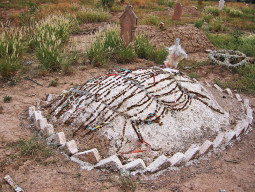
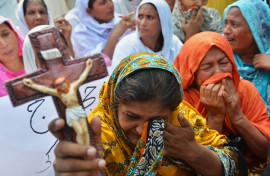
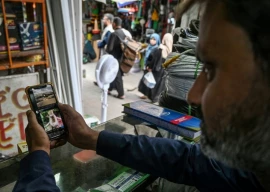
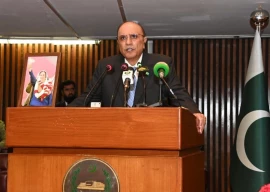
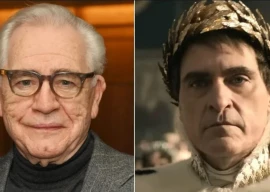
























Much has been said about the situation of Christians in Peshawar after the blast but I think this is the truest picture of the community. Things are a bit better now but there have been seeds of hopelessness and fear, spirits have been shattered, not only people but lives have become paralyzed. May God help us and Pakistan.
So heartbreaking
What can be comment, those who done all this are not humans how they call themselves serving Islam, they are killing innocent in the sacred name of great Allah, shame on them.
No comments from pti fanboys on this one. Guess not!